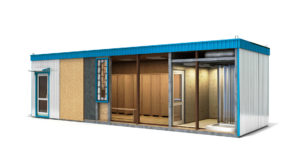
Mobile office trailers have emerged as a practical solution for businesses seeking flexibility, particularly in industries like construction, event planning, and emergency response. These portable structures provide the convenience of an office, no matter where your business takes you. But before you invest, there are some critical questions you should ask. Here’s a guide to ensuring you make the right decision for your needs.

1. What’s the Primary Purpose of the Mobile Office Trailer?
Different uses require different features. A construction site office might need more rugged features, while a mobile sales office may prioritize aesthetics and comfort. Pinpointing the purpose will help narrow down your choices.
2. How Much Space Do I Need?
Consider the number of people that will use the trailer simultaneously. Factor in desks, equipment, meeting areas, and storage. Remember, it’s not just about square footage but how efficiently that space is used.
3. Do I Want a New, Used, or Rental Trailer?
Your budget will play a significant role in this decision. While buying new comes with higher upfront costs, it’s an asset for your company. Rentals are suitable for short-term needs, and used trailers can be cost-effective but might come with wear and tear.
4. What’s the Duration of My Need?
If you need the mobile office for a short project, renting might be more feasible. But if your business model relies on regular use of a mobile office, purchasing might be more cost-effective in the long run.
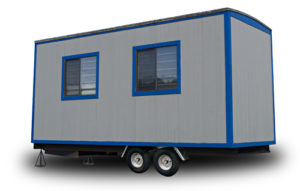
5. What Customization Options are Available?
Some suppliers offer customization, from the floor plan to amenities. Think about your specific needs like insulation, plumbing, electrical systems, and branding elements.
6. How are the Trailers Delivered and Set Up?
Understanding logistics is vital. Inquire about delivery and setup costs, the timeframe, and any requirements from your end, such as site preparation.
7. What are the Financing Options?
If purchasing a mobile office trailer is your choice, explore financing options. Some dealers might offer payment plans or leasing options that could be more budget-friendly than upfront payment.
8. Is There a Warranty or Service Plan?
Knowing that there’s after-sales support can provide peace of mind. Ask about the warranty terms, what’s covered, duration, and any associated service plans.
9. What are the Maintenance Requirements?
Like any structure, mobile office trailers require maintenance. Understand what upkeep is required, potential costs, and who’s responsible, especially if you’re renting.
10. Can the Trailer be Resold or Repurposed?
If you’re purchasing, it’s good to know the trailer’s resale value. Alternatively, consider if the trailer can be repurposed for different needs in the future.

Mobile office trailers offer a blend of flexibility and functionality, making them an attractive solution for various business needs. By asking these ten questions, you’ll be better positioned to make an informed decision that aligns with both your operational needs and budget. As the mobile office trend continues to gain traction, being informed is your best tool for leveraging its benefits to the fullest.
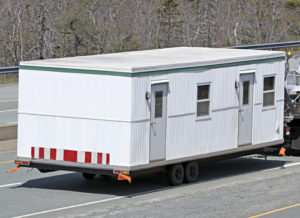
Decoding the Cost: Investing in Mobile Office Trailers
Mobile office trailers, with their convenience and flexibility, have become increasingly popular across various industries. As you consider adding one to your operational arsenal, a critical factor will undeniably be the cost. Let’s dive into the financial aspects of investing in mobile office trailers to help you gauge what to expect.
Factors Affecting Cost
Several variables influence the price tag on mobile office trailers. Here’s a breakdown:
- Size and Layout: Like traditional real estate, size matters. A compact single-room unit will naturally be more affordable than a sprawling multi-room trailer with a complex layout.
- New vs. Used: Brand-new trailers with the latest features will command higher prices. Meanwhile, used trailers, while more economical, might have some wear and tear to consider.
- Customizations: Standard, off-the-shelf models tend to be more budget-friendly. However, adding custom features, from unique floor plans to specialized equipment installations, can increase costs.
- Rental vs. Purchase: Renting a mobile office trailer is often a more cost-effective solution for short-term needs. However, prolonged rental can add up over time, making purchasing a more economical choice in the long run.
- Delivery and Setup: Depending on the vendor, delivery and setup fees might be separate from the base cost of the trailer. Factors like distance, site accessibility, and the required foundation can influence these charges.
Average Costs
While prices can vary based on the above factors and regional variations, here are some general cost estimates to give you a ballpark idea:
- Purchase:
- Small, Basic Trailers: Typically start around $15,000 to $25,000.
- Mid-sized, Standard Trailers: Often range between $25,000 to $50,000.
- Large, Premium Trailers: Can exceed $50,000, especially with high-end customizations.
- Rental:
- Small Trailers: Can range from $200 to $500 per month.
- Mid-sized Trailers: Between $500 to $1,200 monthly.
- Large Trailers: Upwards of $1,200 per month, depending on features.
Keep in mind, these are average figures and can vary based on the specifics of the trailer and vendor policies.
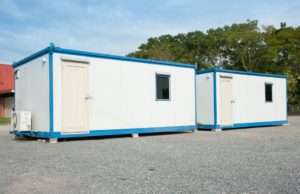
Consider the Long-Term
When evaluating costs, don’t just consider the immediate price tag. Factor in potential maintenance costs, utility fees if applicable, and any potential resale value if you’re purchasing. Additionally, consider the non-monetary value it brings in terms of convenience, flexibility, and operational efficiency.
Investing in a mobile office trailer can be a strategic move for many businesses. By understanding the cost structure and evaluating it against your budget and needs, you can make a choice that serves your business optimally, both functionally and financially.

Assessing the Fit: Is a Mobile Office Trailer Right for You?
Investing in a mobile office trailer is a significant decision that requires careful consideration. Whether you’re a business owner looking to expand operations temporarily or a contractor in need of on-site facilities, understanding if a mobile office trailer aligns with your requirements is crucial. Here’s a guide to help you decide if this flexible solution is your best bet.
Understand Your Needs
- Duration of Requirement: Are your needs temporary, like for a construction project, or more permanent? If it’s short-term, renting might be ideal. If you see a continued need, then buying could be a wiser investment.
- Spatial Needs: How much space do you require? Think not just about floor space but also vertical space, storage, and the layout. Some activities might need open spaces, while others require more compartmentalized settings.
- Location Dynamics: If you often move operations, like certain types of contractors or event managers, the mobility of office trailers offers clear advantages. On the other hand, fixed businesses might consider other solutions unless there’s a specific need for mobility.
Gauge the Benefits
Mobile office trailers offer:
- Flexibility: Easily adapt to changing needs, from location moves to adjustments in size.
- Rapid Deployment: These units can be quickly set up, offering almost immediate operational spaces.
- Cost-Effectiveness: Especially when considering the costs and time frames of building fixed structures.
Consider the Limitations
- Size Restrictions: While modular, there’s an upper limit to how big they can be. For vast operational spaces, traditional buildings or multiple trailers might be needed.
- Permit and Zoning Laws: Some regions have specific laws regarding where and for how long mobile trailers can be stationed. It’s crucial to be informed to avoid legal complications.
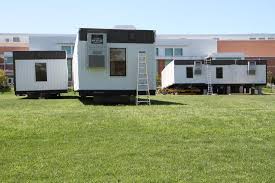
Feedback and Reviews
Speak to other businesses or individuals who’ve used mobile office trailers. Their experiences can provide valuable insights. Reading reviews and testimonials about specific models and vendors can also guide your decision.
Budgeting and Financial Analysis
Finally, perform a thorough financial analysis. Factor in not just the direct costs, but also potential savings in terms of time, reduced rent, or other overheads. Also, consider potential revenue generation, especially if it helps in capturing new business territories or provides better on-site sales opportunities.
Mobile office trailers can be a game-changer for many businesses, offering a mix of flexibility, convenience, and cost-effectiveness. However, they’re not a one-size-fits-all solution. By thoroughly assessing your needs, understanding the benefits, and weighing them against the limitations, you can determine if a mobile office trailer is the perfect solution for your business scenario.

Understanding Mobile Office Trailer Sizes: A Comprehensive Guide
When diving into the world of mobile office trailers, one of the most pivotal considerations is size. Different sizes serve varied purposes and are suited for specific industries and needs. Here’s a breakdown of the most common mobile office trailer dimensions, so you can make an informed decision.
Small Trailers (Single Wide)
- Size Range: Typically between 8’ x 20’ to 14’ x 36’.
- Suitable For: Small construction sites, temporary security checkpoints, ticketing booths, small business operations, or as add-ons to existing office spaces.
- Capacity: Usually designed to accommodate 1-4 people with minimal equipment.
Medium Trailers
- Size Range: Often span between 24’ x 40’ to 28’ x 60’.
- Suitable For: Larger construction sites, temporary classrooms, mid-sized events, or offices that require separate rooms for different functions.
- Capacity: Can comfortably house 5-10 individuals with designated areas for meetings, desks, and storage.
Large Trailers (Double Wide and Beyond)
- Size Range: 24’ x 60’ and up, with some extending beyond 70 feet. They’re essentially multiple trailers joined together.
- Suitable For: Large-scale events, main offices for big construction projects, disaster recovery centers, or as temporary spaces during office renovations.
- Capacity: Designed for 10+ individuals. Often comes with enhanced amenities like kitchenettes, multiple restrooms, and spacious meeting areas.
Custom Trailers
- Tailored to Needs: While there are standard sizes, several providers offer customizable solutions to suit unique requirements. Dimensions, interior partitions, and amenities can be adjusted based on what the business needs.
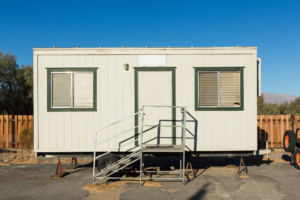
Key Considerations When Selecting Size:
- Nature of Work: A retail office might need a different layout and size compared to a training center or a medical unit.
- Duration: If you’re setting up for an extended period, comfort becomes a priority. Opting for a slightly larger size can make prolonged use more manageable.
- Budget: Larger trailers come at a higher cost. Ensure that the size aligns with your budgetary constraints.
- Location: Consider the space available at the location where the trailer will be placed. Ensure there’s ample room for setup, anchoring, and access.
Choosing the right size for your mobile office trailer is foundational to its success. By understanding the standard dimensions and evaluating them against your needs, you can ensure a functional and efficient workspace tailored to your requirements. Remember, it’s not just about square footage; it’s about how that space is utilized to deliver maximum efficiency and comfort.

The Advantages of Investing in Mobile Office Trailers
Mobile office trailers have been a go-to solution for many businesses, especially those in construction, events, and other industries that require temporary workspaces. As they’ve evolved over the years, these trailers have become more sophisticated and adaptable. Here are the key benefits of investing in mobile office trailers:
1. Flexibility in Location
- Mobile office trailers can be placed virtually anywhere, granting businesses the flexibility to set up operations close to their work site or event location. This proximity can lead to increased productivity and operational efficiency.
2. Cost-Effective
- Compared to constructing permanent structures or renting office space, mobile trailers often present a more economical option. They eliminate the need for long-term commitments and can be repurposed or moved as needs change.
3. Rapid Deployment
- Need an office space immediately? Mobile office trailers can be quickly set up, often in a matter of days, making them ideal for businesses with urgent requirements.
4. Customizable Interiors
- Today’s trailers aren’t just blank spaces. They can be customized with partitions, furniture, and amenities to create a functional and comfortable working environment.
5. Scalability
- As your business grows or project requirements change, additional trailers can be added. This modularity ensures that you can scale your office space in tandem with your needs.
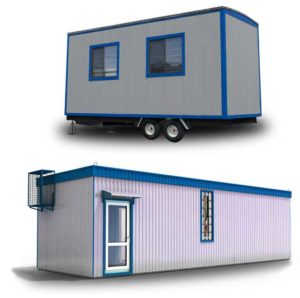
6. Environmentally Friendly
- Mobile office trailers can be reused and repurposed, reducing the need for new construction and minimizing waste. Additionally, by using them, businesses can avoid disturbing the natural landscape with permanent structures.
7. Short-Term Solutions
- For businesses that don’t need a permanent office space (like seasonal operations or short-term projects), these trailers are an ideal solution, providing all the amenities of an office without long-term overheads.
8. Security
- Many modern trailers come equipped with security features like reinforced doors, windows with security bars, and provisions for surveillance systems, ensuring a safe environment for equipment and employees.
9. Professional Image
- Contrary to outdated perceptions, modern mobile office trailers can be quite stylish and professional. A well-set-up trailer can leave a positive impression on clients and partners, showcasing a company’s adaptability and resourcefulness.
10. Business Continuity
- In cases of emergencies or unforeseen events where primary office spaces become unusable, mobile office trailers can act as temporary hubs ensuring business operations continue with minimal disruption.

Mobile office trailers are more than just temporary spaces; they’re adaptable solutions tailored to modern business needs. Whether it’s the flexibility of location, rapid deployment, or cost savings, the benefits make them a compelling choice for many businesses. Before investing, consider your requirements, potential growth, and the advantages outlined here to make an informed decision.
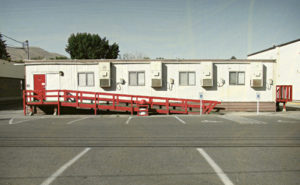
Navigating Permits for Mobile Office Trailers
One of the most common questions that arise when considering a mobile office trailer is the requirement of permits. Understanding the regulations in your area is crucial to avoid any potential legal complications. Here’s a breakdown of what you should know about permits for mobile office trailers:
What is a Permit?
A permit, in this context, is an official approval issued by local or municipal authorities that allows an individual or a business to place and use a mobile office trailer on a particular piece of land. This approval ensures that the trailer conforms to zoning laws, safety standards, and other local regulations.
Why is a Permit Needed?
- Safety Concerns: Local governments want to ensure that any structure, including mobile office trailers, meets safety standards to protect the occupants and the surrounding community.
- Aesthetic and Community Standards: Some areas have regulations in place to maintain a certain aesthetic or to prevent overcrowdedness. A permit helps uphold these community standards.
- Infrastructure Considerations: The local authorities might want to check if the location you’ve chosen for your mobile office trailer might interfere with public utilities or services.
Do You Always Need a Permit?
The need for a permit largely depends on:
- Location: Urban areas with dense populations are more likely to require permits than rural areas.
- Duration: Some localities may not require a permit if the trailer is being placed for a short duration. Conversely, longer durations might necessitate a more extensive permit process.
- Size and Type: Larger trailers or those with certain modifications might be subject to different regulations than smaller, more standard models.
How to Obtain a Permit:
- Research Local Regulations: Start by checking with your local city or county planning or zoning department. They will provide you with specific information on requirements, fees, and the application process.
- Site Plan: Most local authorities will require a detailed site plan indicating where you intend to place the mobile office trailer. This helps assess any potential issues with the proposed location.
- Inspection: Once your application is submitted and reviewed, an inspector might visit the proposed site to ensure everything is in order.
- Fees: There’s typically a fee associated with obtaining a permit. These fees can vary widely based on location and the nature of your setup.
Possible Complications:
- Zoning Restrictions: Your desired location might be in a zone that doesn’t allow for mobile office trailers. In such cases, you may need to either choose a different location or seek a zoning variance, which can be a lengthy process.
- Delay: The permit process can sometimes be time-consuming, especially in areas with high demand or bureaucratic delays. It’s wise to account for this when planning.
While the idea of needing a permit might seem daunting, it’s a necessary step that ensures the safety and harmony of the community. Always plan ahead, and be sure to factor in the time and costs associated with obtaining a permit when considering a mobile office trailer for your business operations.

Renting vs. Buying Mobile Office Trailers: Choosing the Best Option for You
Mobile office trailers have become an essential tool for businesses that require temporary or relocatable office space. But one crucial decision that businesses face is whether to rent or buy a mobile office trailer. Both options have their unique sets of advantages and drawbacks. Let’s delve into the factors you should consider when making this decision.

Renting a Mobile Office Trailer
Advantages:
- Flexibility: Renting allows for short-term use, making it ideal for businesses that need office space for temporary projects or events. Once the lease term is up, the rental company will handle the removal.
- No Maintenance: Most rental agreements include maintenance in the package. So if there’s a problem with the trailer, the rental company typically handles repairs.
- Budget-Friendly: For companies that don’t have the capital to purchase a trailer outright, renting offers a more affordable short-term solution. There’s no large upfront cost—just the ongoing rental fee.
- Upgrade Potential: As your needs change, you can easily upgrade or downgrade the size of your mobile office trailer when renting.
Drawbacks:
- Long-term Costs: If you rent for an extended period, those monthly fees might end up costing more than buying outright.
- Lack of Customization: Rental units are often generic to meet a wide range of needs, limiting how much you can modify the interior or exterior.
Buying a Mobile Office Trailer
Advantages:
- Cost-effective in the Long Run: If you anticipate using the trailer for several years, buying can be more economical over time compared to the ongoing costs of renting.
- Customization: Owning your trailer means you can customize it to fit your specific needs, both in terms of interior layout and external branding.
- Asset Ownership: The trailer becomes a business asset that can be depreciated over time, potentially providing tax benefits. Furthermore, if you ever decide you no longer need it, you can sell it.
- No Contractual Obligations: There’s no need to worry about the stipulations and restrictions that come with a rental agreement.
Drawbacks:
- Upfront Costs: Purchasing a mobile office trailer requires a more substantial initial investment compared to the relatively low monthly costs of renting.
- Maintenance Responsibility: Any repairs or necessary maintenance will be your responsibility, which can add to the long-term costs of ownership.
- Less Flexibility: If your needs change, adjusting might require selling your current trailer and buying a new one, which can be a lengthy process.
Factors to Consider:
- Duration of Need: If your need is short-term (a few months to a year), renting might be more cost-effective. For longer-term needs, buying might make more financial sense.
- Budget Constraints: If upfront costs are a concern, renting provides a way to secure a trailer without the financial burden of a purchase.
- Customization Requirements: If your business requires a unique setup, buying might be the better option as it allows for more personalization.
- Future Growth and Changes: Consider the potential growth of your company. Will you need a larger or smaller space in the future? Your projected needs can influence whether renting or buying is the right choice.
The decision to rent or buy a mobile office trailer largely depends on your specific business needs, financial situation, and long-term plans. It’s essential to weigh the pros and cons of each option and consider how they align with your business goals. By doing so, you can make an informed decision that best supports your company’s operations and growth.


